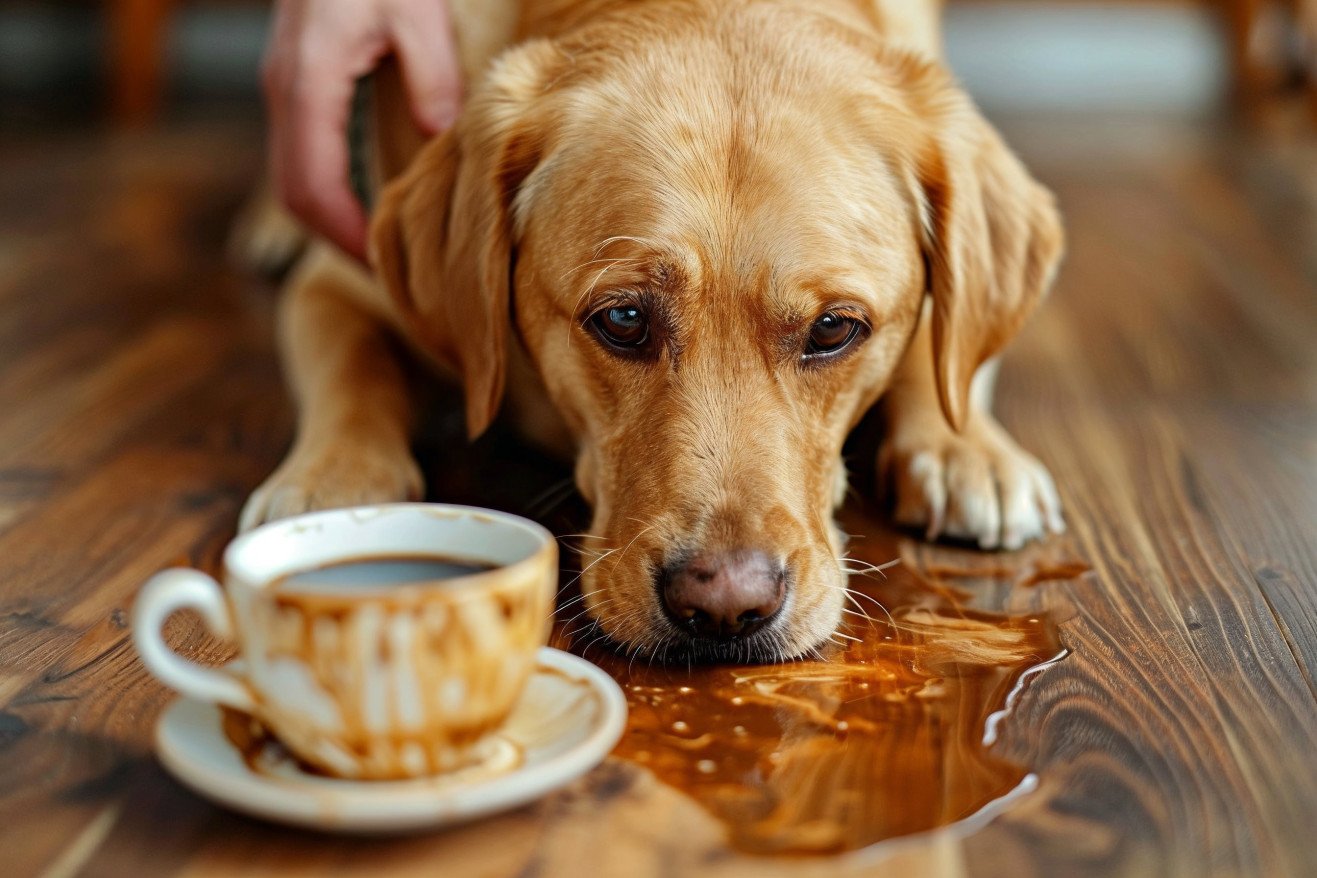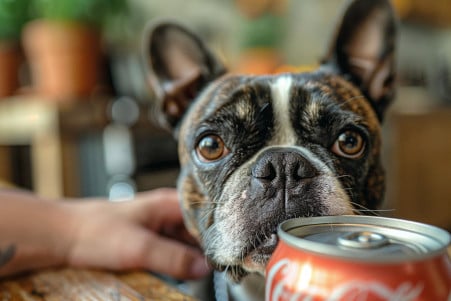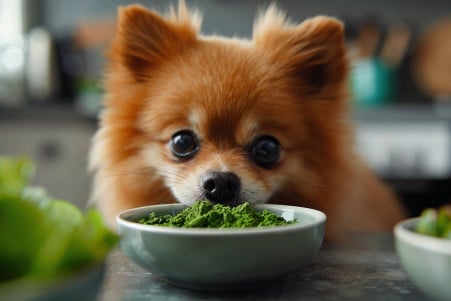Can Dogs Have Coffee? Here's What You Need to Know About the Dangers
30 March 2024 • Updated 29 March 2024

Many dog owners have probably wondered at some point, can dogs have coffee, or is it best to keep this popular morning beverage away from our furry friends? Coffee contains caffeine, a central nervous system stimulant that is poisonous to dogs in high doses. As a result, it's not recommended to give dogs coffee or any other caffeinated products. Even small amounts of coffee can lead to symptoms like hyperactivity, tachypnea, tachycardia, and seizures in dogs. Instead, make sure to offer your dog plenty of fresh water to ensure that they stay healthy and hydrated.
Although it can be easy to dismiss the potential dangers of coffee for some pet parents, it's important to be aware of the potential risks and side effects that coffee can pose to a dog's overall well-being and temperament. By reviewing veterinary research, toxicology case studies, and expert insights, we'll take a closer look at how caffeine affects dogs and offer tips to help you prevent your dog from accidentally consuming coffee.
Can dogs drink coffee?
Caffeine Toxicity: How to Protect Your Dog
Caffeine is a central nervous system stimulant that can be highly toxic to dogs, even in small doses. According to VCA Animal Hospitals, dogs are much more sensitive to caffeine than people. What might be a small, harmless amount of coffee to humans can be toxic or even deadly to dogs.
The level of toxicity depends on the amount of caffeine consumed, as well as the size and health of the dog. Smaller dogs are at greater risk, especially if they consume larger amounts of caffeine. In fact, as the Pet Poison Helpline notes, as little as 1-2 diet pills or the ingestion of a moderate amount of coffee grounds can be lethal to small dogs.
Signs of caffeine poisoning in dogs can occur within 1-2 hours of consumption and include hyperactivity, vomiting, elevated heart rate and blood pressure, tremors, seizures, and in more severe cases, collapse. MasterClass explains that even small amounts of caffeine from coffee, tea, or energy drinks can cause dogs to experience rapid breathing, heart arrhythmias, muscle tremors, and seizures.
The most dangerous form of caffeine for dogs is coffee beans or grounds. While a few licks of brewed coffee may only cause mild symptoms, coffee beans or grounds can be lethal due to their high caffeine content, according to veterinarians.
It's important for dog owners to understand that dogs don't metabolize caffeine the way humans do. What may seem like a small issue to us can be a big problem for dogs, even leading to death. As a result, it's important to keep caffeinated products out of their reach.
Other Household Dangers: Common Foods and Items Toxic to Dogs
While coffee and caffeine can be dangerous to dogs, they are not the only household items that can pose a threat. Many common human foods can also be dangerous to dogs. According to the American Kennel Club, chocolate, onions, grapes, and macadamia nuts are just a few examples of foods that can be extremely toxic to dogs, causing symptoms such as vomiting, diarrhea, liver failure, and death.
The GoodRx article lists 26 common foods and drinks that are poisonous to dogs, including avocado, cherries, mushrooms, sugar-free gum, and alcohol. In addition, the ASPCA warns that xylitol and certain medications are also toxic to pets.
Pet parents need to make sure that these items are kept in a place that is inaccessible to their dogs. This requires being informed and taking steps to prevent exposure to these hazards to ensure the health and safety of our furry friends.
Emergency Response: First Aid and Veterinary Care for Accidental Ingestion
If a dog has ingested coffee, caffeine, or other toxic substances, it’s important to act fast. According to the Pet Poison Helpline, the first thing you should do is call a veterinarian or pet poison control hotline immediately to get help.
The vet may suggest that you induce vomiting or give your dog activated charcoal to absorb the toxin, notes the Outward Hound article. In addition, the WagWalking guide on caffeine poisoning in dogs explains that your dog may need supportive care, including IV fluids, anti-vomiting medication, and cardiac monitoring.
Make sure to tell the vet exactly what your dog ingested and how much so that they can provide the appropriate treatment. With fast action and professional help, dog owners can make sure that their pets don’t suffer the worst consequences of accidental caffeine exposure.
Healthy Hydration: Non-Caffeinated Alternatives to Water for Dogs
While water is the best and most important beverage for dogs, there are a few other options that dogs can drink in moderation. According to Wild Earth, unsalted bone broth, vegetable and fruit juices, and herbal teas like peppermint or chamomile can all help hydrate and nourish dogs.
That said, dog owners should steer clear of giving dogs milk, since many dogs are lactose intolerant, and plant-based milks can also lead to digestive problems, according to the American Kennel Club. In addition, Dogster and PetCube caution against giving dogs alcohol, caffeinated drinks, and drinks with added sugar, salt, or artificial sweeteners, all of which can be toxic to dogs.
As with any new addition to a dog's diet, it's always best to talk to a vet before giving a dog a new type of beverage. Vets can offer individualized advice on which hydration options are safe and healthy for your dog.
Conclusion: How to Keep Your Dog Safe and Hydrated
Because of the risk of caffeine toxicity, it’s best to keep coffee and other caffeinated beverages away from dogs. Even small amounts of caffeine can be toxic to dogs, causing symptoms such as restlessness, rapid breathing, and seizures. Dogs are much more sensitive to caffeine than people.
The American Kennel Club notes that a few licks of coffee are unlikely to poison most pets, but eating coffee grounds or beans can be especially dangerous and potentially toxic, especially for small dog breeds. Symptoms of caffeine poisoning can start to show within 30-60 minutes and can last for hours or even days. Veterinary treatment may be necessary to induce vomiting, provide fluids, and manage abnormal heart rates and seizures.
It’s also important to remember that there are many other common household items and human foods that are toxic to dogs, including chocolate, onions, and xylitol, and that if a dog ingests any of these, it will require immediate veterinary care. To ensure that dogs are safe and hydrated, pet parents should make sure that they have access to fresh water and can also consider giving them caffeine-free alternatives like bone broth or herbal teas in moderation.
With knowledge and care, pet parents can make sure that their furry friends stay healthy and happy.


